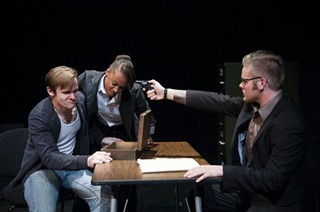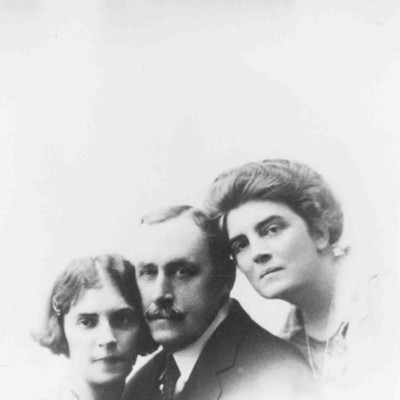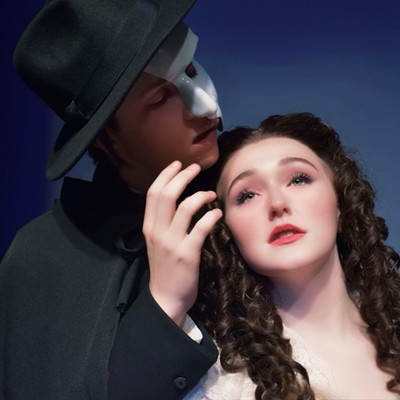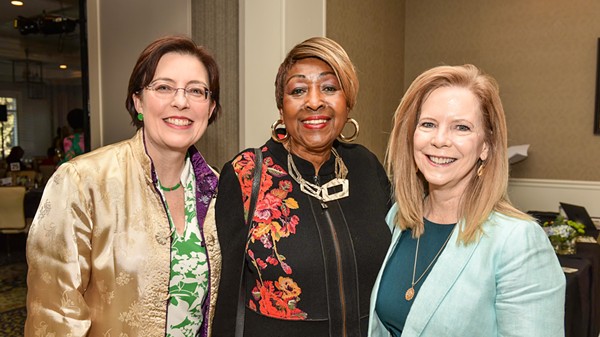IF YOU find American Horror Story way too tame and haunted hayrides put you to sleep, The Pillowman might be your kind of Halloween week entertainment.
Full of references to dismembered body parts, sick torture and ghastly riddles, Martin McDonagh’s Tony award-winning black comedy is as creepy as it gets.
The tight script dances deep into taboo territories, mining appalling topics to the absolute edge of absurdity. Child abuse and crucifixion aren’t exempt from the play’s wry lens, and one reviewer remarked that it “makes Kafka seem like Neil Simon on happy pills.”
If that description has you gleefully rubbing your palms together with delight, you won’t want to miss the macabre fun when the Armstrong Masquers present The Pillowman at the Jenkins Hall Black Box Theatre Oct. 28-Nov. 1.
“Be prepared for an unsettling experience,” warns director James Carroll, an ominous bwahahaha lurking in the corners of his conversation with Connect last week.
“This is one intense ride.”
The Pillowman centers around Karturian, a writer with a penchant for churning out gruesome fairy tales that are decidedly not for children. (The title refers to one of his characters, a plushy ghoul that convinces kids to commit suicide rather than suffer the misery of grown-up life.)
He and his half-wit brother, Michal, live under a nameless totalitarian dictatorship where dissent is punished brutally and swiftly. When the brothers are detained by a pair of Dostoevskian cops, Karturian assumes it’s for his veiled political criticism. Instead they’re both under suspicion for the murders of several neighborhood youth, each killed in a manner prescribed in Karturian’s scary stories.
What happens next is what might happen if an episode of CSI met Crime and Punishment in a dark alley behind Gregor Samsa’s garage.
“The oppression of the police state really sets the tone,” explains Carroll, an Armstrong senior whose last directorial foray was a much lighter production of The Foreigner last spring.
“Totalitarianism is terrifying because the police are in such control. It creates part of the mystery—are they lying? Has this all been orchestrated to pin on a writer just because they don’t like his work?”
As mentioned above, Karturian’s work involves some pretty sadistic stuff, and the stories are played out on stage along with scenes from his and Michal’s beyond-disturbing childhood. Walter Pigford (Godspell, Killer Joe) shoulders the role of the tortured writer, while Jon Nash plays his mentally disabled brother.
The good cop/bad cop dynamic also drives The Pillowman’s plot, and Carroll made bold casting choices for the roles: Freshman Harris Cutcher snagged the part of the aloof Tupolski (“He absolutely brought it at the audition”) and Justine Scrutchins portrays the tightly-wound Ariel.
To Carroll’s knowledge, this is the first time that a woman has been cast as the Ariel character.
“I thought it would be interesting. It adds a new and weird element to the production, and it totally works,” says Carroll, adding that the gender twist also saves space in Jenkins Hall’s 50-seat Black Box Theater.
“She and Harris also play the mother and father as well, which economizes things.”
Meagan Reneé Dyer rounds out the cast by playing different little girls in several of Karturian’s morbid stories.
It can’t be stressed enough that is not a show for the faint of heart—nor for those who do not appreciate a sick sense of humor. McDonagh’s play is a comedy after all, and if dead baby jokes make you gag you probably ought to go find a nice hayride to attend.
“The hardest part is keeping up with the comedy in such dark subject matter,” admits Carroll. “It’s all about the timing.”
The Pillowman’s sardonic wit is well-recognized and highly-regarded: It debuted in London to rave reviews with a 2003 production starring Dr. Who’s David Tennant as Karturian and Jim Broadbent as Tupolski, winning the Laurence Olivier Award for Best New Play. In 2005, the New York version featuring Billy Crudup and Jeff Goldblum in the same roles snagged a Tony for Best New Play.
While the combat action of The Pillowman is graphic and brutal, it packs its most powerful punches in its psychological thrills: How far can the horror go? How responsible is an artist to his audience? Just how far out to the edge are we willing to go for a good yarn?
“This play, it’s not disturbing just for the sake of being disturbing, it’s about the storytelling,” muses the director.
But just because the frights are mental doesn’t mean they won’t deliver the shivers.
“Oh, there are going to be some screams,” promises Carroll with a hint of an evil chortle.
“There’s going to be a lot of sick laughter, too.”






























